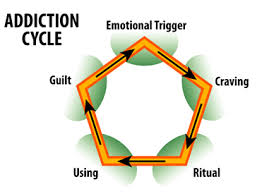Probably one of the most common things I hear people say in regards to addiction is, “I just don’t understand why they do it.” This is typically coming from the family member or friend who cannot seem to wrap their head around why someone would continue to engage in such harmful and self-destructive behavior. From a non-addict perspective, asking this question makes a lot of sense.  The answer, however, is multi-layered and multi-faceted. There is rarely one thing that answers the question as to why individuals continue to engage in addictive behavior.
The answer, however, is multi-layered and multi-faceted. There is rarely one thing that answers the question as to why individuals continue to engage in addictive behavior.
In fact, we find that in working with those struggling with addiction there are often a combination of factors that lead them to try coping with their problems or emotions with addictive substances or processes. In order to help answer the question of “Why do they do it??”, here are a couple of common reasons why people engage in addictive behavior.
Trauma/Intense Emotions = Temporary Relief– Most individuals engaging in addictive behaviors know that the behavior is destructive, however, they continue because of the short term temporary relief that they experience when they are using. Often whatever they are experiencing (either internally or externally) is so overwhelming that the short period of relief feels more worth it than the destruction it may cause. For example, if an individual is a victim of sexual abuse and becomes overwhelmed with pain every time they think of the abuse, so much so that it may even physically hurt, then they may look for anything that will give them some relief – even if it’s just short term. Of course, this thinking process is distorted, but when someone is actively engaged in their addiction, the rational thinking part of their brain (the prefrontal cortex) is not operating at its fullest. Instead, the emotional part of their brain (the limbic system) is firing and saying, “I just want to feel better now”, so the drugs or acting out behavior provide that short term relief.
Instead, the emotional part of their brain (the limbic system) is firing and saying, “I just want to feel better now”, so the drugs or acting out behavior provide that short term relief.
Lack of other coping skills – Another common reason why individuals continue to engage in their addiction is because they may not have developed more sophisticated ways of dealing with difficult life experiences or intense emotions. This is especially true for the adolescent who started using at an early age, and has perhaps always learned to turn to a substance or process (e.g. video games, technology) when they feel uncomfortable. This is true for many adults as well. It comes from what was modeled for them in their life about how to deal with overwhelm. Many individuals struggling with addiction have said to me in session, “I don’t’ know what else to do”. This may sound like an excuse, and sometimes it can be, but from a brain science standpoint it makes perfect sense. In the moment of overwhelm (e.g. extreme anxiety or fear), they resort to what their brain is most familiar with (even if they have learned other things). For example, someone may know that they are supposed to breath, journal, and meditate when they are feeling overwhelmed, but in the moment that their emotional (limbic) brain is firing, the only thing that they can think to do is use or act out – because that is what is most familiar. All in all, if someone has learned to respond (cope) by engaging in addictive processes, then it takes time for new paths (such as breathing, meditating, etc…) to become their default. This is why you may see addicts engaging in the same negative behaviors over and over again despite the fact that they “know better”. Although our brain patterns can change, it takes time.
Individuals impacted by the addiction of a friend or family member are always searching for an answer. It’s human nature to question why and want to have an answer to explain such seemingly irrational behavior. The truth is, however, that many individuals struggling with addiction engage in this irrational behavior because they lack their own self worth. Their feelings of worthlessness often leave them not caring whether they continue to hurt themselves, and thus others around them, as well. It’s often not until they get sober that they can begin to understand the why themselves. Perhaps the best thing that friends and family can do to help the addict get closer to the understanding of why is remind them of how worthy they are, and let them know that they deserve a better life.